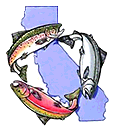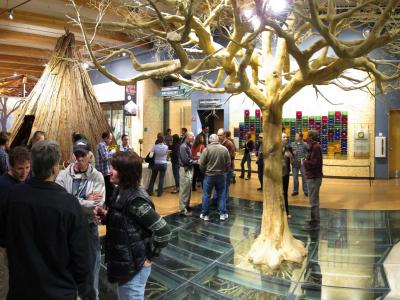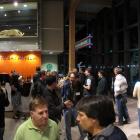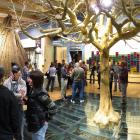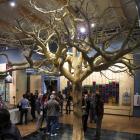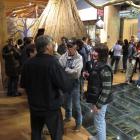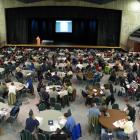The 28th Annual Salmonid Restoration Conference took place in Redding and was focused on Fisheries Restoration and Science in a Changing Climate.
Salmonid Restoration Federation (SRF) and the California-Nevada American Fisheries Society (AFS) chapter hosted an historic joint 28th Annual Salmonid Restoration Conference and the 44th Annual Cal-Neva AFS Conference in Redding, California. This was a truly collaborative effort that engaged both the habitat restoration community and fisheries scientists. More than 650 people attended the conference from all over the Pacific Northwest. The theme of the conference was Fisheries Restoration and Science in a Changing Climate since the conference addressed the challenge of recovery and restoration efforts in the face of global climate change, water shortages, and California’s evolving political landscape. In this era of climate change, a state budget crisis that has paralyzed the restoration field, and diminishing salmon returns, it is more important than ever for fisheries scientists and restorationists to gather together to share resources, techniques, strategies and methodologies to restore habitat and recover wild salmon populations.
SRF and AFS created a dynamic conference agenda that addressed pressing issues that affect salmonid recovery and fisheries throughout the Pacific Northwest. The first two days of the conference included symposia, fullday workshops, continuing education classes, and field tours.
Workshops on topics including Water Quality and TMDLs, Floodplain Restoration, a Fisheries Engineering and Stream Restoration Symposium, Stormwater Pollution Workshop, and CE classes on acoustic tag training, and River 2 D technology.
Field Tours visited restoration projects in Clear Creek, Battle Creek, the Upper Trinity River, the Shasta River, the Upper Sacramento River, and a Redding urban streams tour including Sulphur Creek, Salt Creek, and gravel augmentation projects. Redding was an exciting place to host the conference since it is close by to so many largescale restoration projects and inspiring collaborative efforts.
Tribal leader Caleen Sisk-Franco of the Wimmenu Wintu tribe gave an opening ceremonial prayer and an impassioned call to bring back the native Mokelumne wild salmon that are now extinct but whose genetic stock was introduced in the Maori ancestral homelands in New Zealand. Her opening blessing and plea provided a global context to the plenary session. Plenary keynote presenters included David Montgomery, author of King of Fish: the Thousand Year Run of Salmon and Dirt: the Erosion of Civilization, who spoke about the demise of civilizations based on agricultural practices that depleted soils, denuded upslope areas, and brought sediment to rivers thus impacting fisheries.
